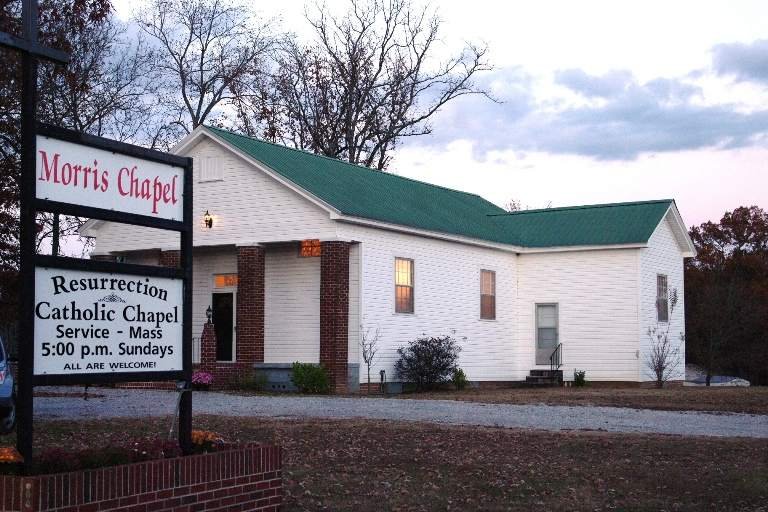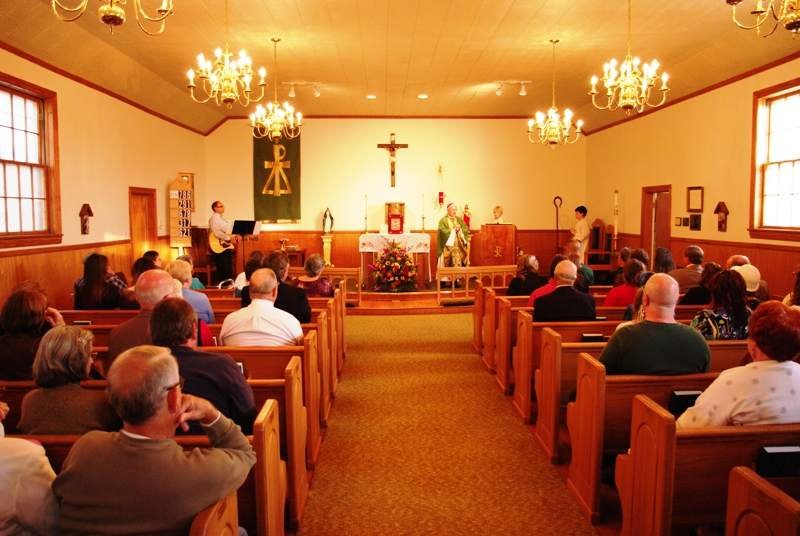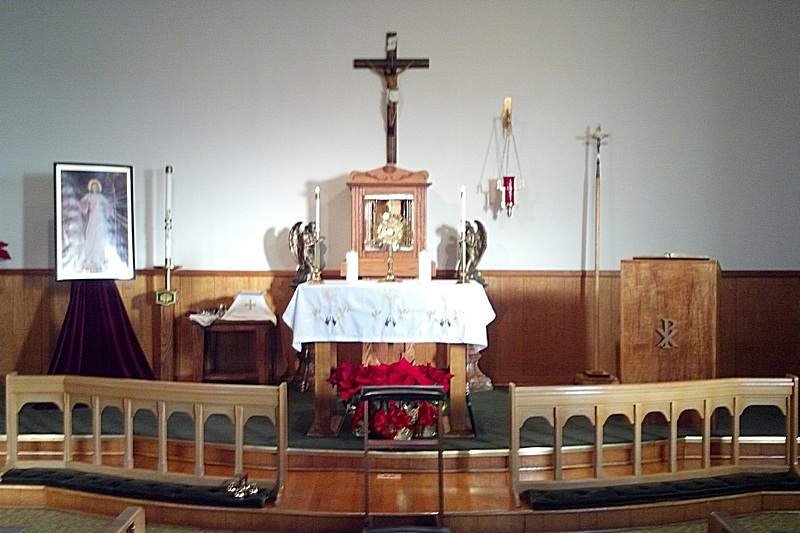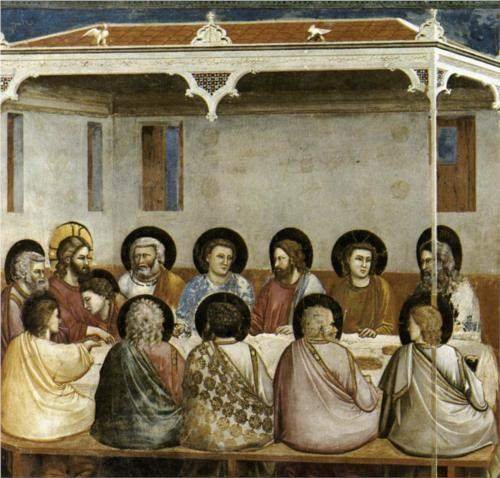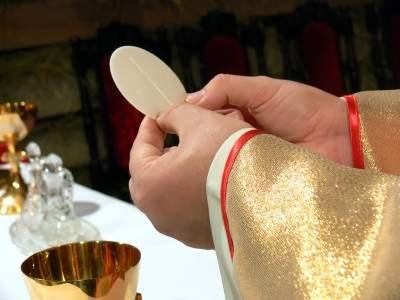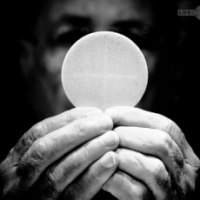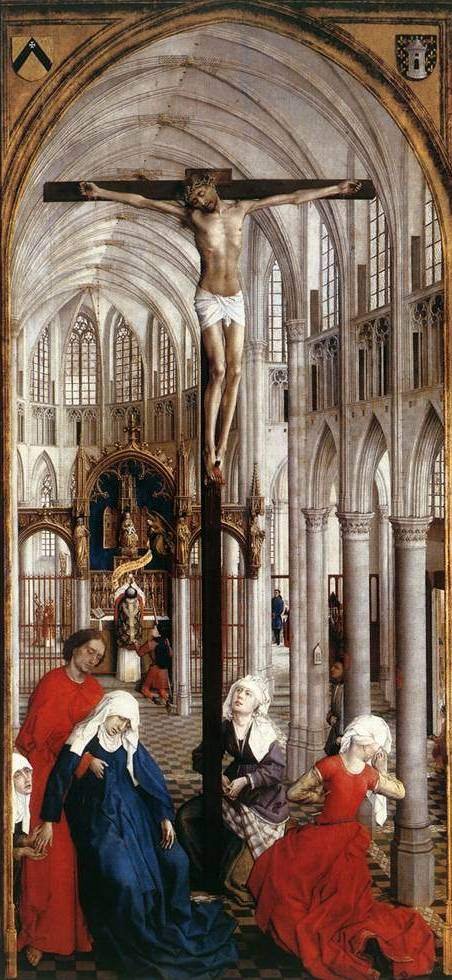This is a post I’ve been thinking of for a little while. Here are a few reasons why I love my new parish, Resurrection Chapel:
-
My connection: The sudden revelation of a deep, historical connection with the church here — one that God knew I would appreciate and be attracted by — lit my path here, and reminds me that He is guiding my steps. Just this past week, I discovered yet another connection: my mom’s closest cousin Dana is a dear friend of Rick Chenault our parish director and Peggy his wife.
-
The building: Not only is the church building a lovely and cozy place, but I learned this past weekend that it is apparently built around the church’s original log structure, founded in ca. 1852 and moved here from the church’s original location a few miles down the road. When I go to church, I am standing not merely in the same locale, but in the same building and the same spot as my ancestors. It makes me giddy to think of.
-
The name — Resurrection — is apt on so many levels. This parish signifies the rebirth of Catholicism in this area, which was actually the location of the first Catholic church in what became the Diocese of Birmingham. It is the calling back to the Church of so many lapsed Catholics who have been away from the Sacraments. It is the rising again of a vibrant church on this spot, where a Methodist congregation flourished for so many years. It stands alongside an old country cemetery, where so many faithful Christians are resting in the hope of a glorious resurrection.
-
The very idea of a rural parish appeals to everything I love — to my Southern, agrarian, hobbitish ideals. We are pioneering the Church at its frontier, delving into an area darkened not only by the recession of Catholicism but among so many, of Christianity in general. We are bearing the torch of the Gospel and the light of Christ’s love where no Catholic has gone before, or at least not in a very long time.
-
It is small, like me. I have a hard time in a big place. I was going to Mass at the parish most local to me for months before I even spoke to anybody or anybody spoke to me. I felt lost in the crowd, swallowed hole, overwhelmed. But I set foot in Resurrection Chapel and immediately people saw me and greeted me. Mr. Rick* welcomed me warmly and invited me back, and a dozen or more people introduced themselves after Mass. I felt love, and connection, and fellowship, from the very first moments, when those are things that have always come so hard for me. I don’t fault the people of the larger parish at all: it’s not a failure to love; just a failure of the dynamic of a large parish, and of me to reach out and take the connection that would be there if I did.
-
Following from that point, the people in general. It’s not just any people who would reach out to me in the way these have. They are so loving and welcoming and full of charity in a way that does go beyond so many other churches. My dearest friends at St. John’s, found over the course of so many months, can compare. And here, after just a few weeks, I feel fully a part of their family.
-
Opportunities for ministry: Part of it, I guess, is that I was just a baby Catholic when I was at St. John’s (in so many ways, I still am), but from the very beginning here, I’ve been offered the chance to minister for the Lord. Mr. Rick asked almost immediately to be thinking about any ways I would like to minister: as a lector, or an extraordinary minister of Holy Communion, or anything else. I am still a neophyte! I feel so unworthy. But this past Sunday, I was given the opportunity to present the gifts — something that has always been such an important part of the liturgy for me. And my dear new friends Leo and Harriet have welcomed me so warmly as a helper in the RCIA class. And Mr. Rick invited me to be a part of a meeting of the Society of St. Vincent de Paul, which is truly doing God’s work in our community of ministering to the poor and hurting, the very first time I came to Mass.
-
There are certainly many downsides of not having a dedicated priest as pastor in our parish, but I also value the upside: I can get to know many priests. I have already met half a dozen or more dear priests on a personal level, and that is so valuable to me in my growth as a Catholic.
-
It’s a bit of a drive to get there — something I have really missed for so long, living in a small town like Oxford and especially now living at home. Time alone in the car, to revel in the open road, if only for a few miles and minutes, time to listen to my podcasts and my music, and to decompress and destress, is so precious to me. And I love Lawrence County and love going there and should go much more often.
-
Altar rails! ‘Nuff said. But the traditional mode of taking Communion, of reverencing our Lord in the Eucharist and receiving him humbly, is to kneel. And we didn’t build these — they came with the church, a gift from the Methodists. I know God saw us coming, and prepared this place for us.
-
Miracles: God is at work here. It shows in everything we do. But it especially shows in several miracles I heard about this past weekend. Especially this: A woman, eaten up with cancerous tumors and given not long to live, was prayed for and anointed with oil, and on her next CT scan, her tumors had begun to shrivel up. On the next scan after that, they were completely gone. That was a year or two ago, and she is still healthy. Another one I heard about may not be for public consumption, and I might be forgetting something else.
-
And most of all, I love the great miracle the Holy Spirit gives to us each week, the Eucharist. I love that Christ comes to meet us in the flesh, in His Body and Blood, Soul and Divinity. I love the intimate communion Holy Communion brings, made all the more intimate by sharing it with people I know and care for and can truly commune with. I love that Christ is in our midst, in His Church, and this in every parish on earth, anywhere I go.
* I never know what to call Rick. It feels so cold to just call him “Rick,” after all he does for us and for the parish. Being Catholic necessitates a new set of terms of endearment. I can’t call him “Brother Rick,” as per my Evangelical inclination, because he’s not a brother in any order. I can’t call him “Pastor,” because he’s not a priest, and that’s not a title he claims. “Mister” will have to do for the time being, until I can call him “Deacon.”

